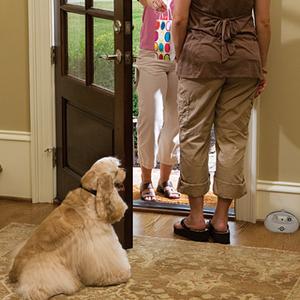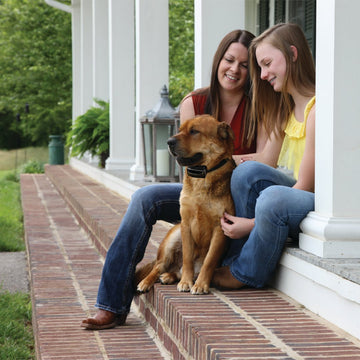By Dean Vickers, Director of Animal Welfare Studies and Education at PetSafe
 As we know, dogs bark for a variety of reasons. They may howl, whine, growl or outright bark. There is nothing unusual about this. After all, they are dogs. Some barking is good. We want them to bark to warn us of danger or protect us. It isn’t the general barking that can frustrate us, it is when the barking becomes excessive.
As we know, dogs bark for a variety of reasons. They may howl, whine, growl or outright bark. There is nothing unusual about this. After all, they are dogs. Some barking is good. We want them to bark to warn us of danger or protect us. It isn’t the general barking that can frustrate us, it is when the barking becomes excessive.
‘Excessive’ can also mean different things to different people. I can put up with some barking, but I also have a tolerance threshold. The solution, you ask? There are several things that you can try that may solve your issue. Generally speaking, your dog needs to understand when it is alright to bark and when he needs to be quiet.
The first step is to determine why your dog is barking. Learn to understand the differences between his barks. Is it out of fear or protection, or is he just bored and wanting to play? Once you determine the cause of the barking, you are better able to get a handle on addressing the problem. You will need to establish a training regiment and work with your dog on curbing this behavior.
The best way to curb excessive barking is to identify the cause and remove it. Basically, you will provide him with a better option than the barking. Once you begin the training process, you will want to make certain that you are closely watching your timing. You do not want to mistakenly reward the wrong behavior. 
- Start by trying to distract him with a clap or whistle. Once he is quiet, you can praise him and redirect his attention to something else, like a toy or a treat.
- After getting your dog's attention, practice basic commands, like sit and down in order to redirect his behavior and his focus.
- A lot of trainers encourage teaching your dog to ‘Speak’ and ‘Quiet.’ It is just as it sounds. You teach your dog when it is alright to bark, and then you teach him when he needs to be quiet. This is done through giving rewards when he does the behavior you want and with holding the rewards when you are not getting the behavior you want. This can be a very long process, but it does allow you to spend quality time with your dog.
- Exercise is key as well. Dogs may have a lot of pent up energy they release while barking. Remember, having a fenced yard doesn’t mean that your dog is getting adequate exercise.
- If your dog is needy or has separation anxiety, make every effort to not leave him alone for extended periods of time. If you must be away, you could have a neighbor or friend check on him during the work day. Avoid leaving a lonely dog alone for long periods of time if possible.
- If your dog is barking for attention, avoid comforting or feeding him. (The same goes for allowing him to jump up on you) By giving him a treat, you are rewarding an unwanted behavior.
- You may also want to look into anti-bark collars. There are different varieties: ultrasonic, citronella spray, air spray, vibration and static. These can be very effective when used correctly. Make certain that you read the instructions before you try these products. Similar to rewarding your dog with a treat, you want to make certain you are addressing the correct behavior and not making it worse.
- I don’t believe in debarking a dog. If that is of interest to you, consult your veterinarian for more details.
The flip side to this is what you do when the barking dog is your neighbor’s dog. This situation can be a very tricky one. On one hand, you don’t want the dog to suffer if the neighbor takes out his frustration on the dog, but sleep is necessary, as is peace and quiet. The best approach, in my opinion, is to speak with your neighbor. This may be awkward and it does identify you as someone who has complained.
A second thought is a nicely written letter – let me stress nicely. You may even suggest a dog trainer in the letter or possible solutions for the owner to try. I am a firm believer in balance and moderation. I want my dogs to be dogs. I want them to be able to run, play, bark, sniff…all the things that make a dog happy. Yet, I also want to be respectful of my neighbors, and my own sanity, by not enduring hour upon hour of relentless barking. Take a deep breath and find your inner calmness. Good luck!
ABOUT DEAN
As Director of Animal Welfare Studies and Education, Dean provides education on the proper use and benefits of PetSafe products to legislators and pet owners worldwide. Spending most of his career in advocacy, the former Ohio State Director for The Humane Society of the United States (HSUS) has assisted with animal abuse and neglect cases, as well as assisted with rescue during natural disasters, animal hoarding, and large scale animal abuse cases. He is a graduate from The Ohio State University with a degree in History and Political science. He currently lives in Knoxville with his 3 rescue dogs, Annikka, J’Maul and Isabella.











